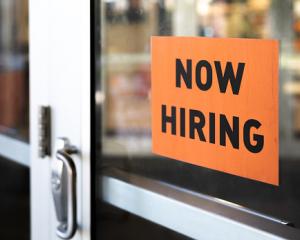
However, the country’s biggest employers are notable in their absence, Finance Minister Grant Robertson confirming only one application by a firm employing more than 500 people had been made so far.
The subsidy covers a two-week period, paying $600 a week for each full-time employee and $359 a week for each part-time employee.

Small Business Voice chief executive Max Whitehead said that money bought struggling firms a bit of time.
‘‘That’s something that they’ve really got to lean on,’’ he said.
‘‘It certainly still won’t be a life-saver, most of them will still be struggling, but it may hold them together for a period of time to cope in the short term.’’
If the lockdown went on much longer there would be casualties, many firms having headed into it without much in reserve, he said.
‘‘They want to expand their business and grow it and of course that’s what they do... they put their money back into the business, invest in more equipment, more employees, those sort of factors.
‘‘And of course, when it all comes crumbling down like it does to Level 4, they just hold their breath and just hope that we’re going to get out of this very, very soon.’’
While small businesses were jumping on the assistance packages, larger employers did not appear to be.
First Union spokesman Jared Abbott suspected why.
‘‘Some of these bigger companies have not liked the scrutiny on the massive profits that they made off the back of Covid.’’
He said many had also been able to operate to some degree under this Level 4 lockdown, when they could not last year.
‘‘A lot of companies seem to be taking a very broad interpretation of what an essential service is and a lot of the companies that were shut down, especially distribution centres and stuff like that in the first lockdown, have decided that this lockdown they’re essential services.
‘‘And I think that’s reflected on online shopping. If you look at a lot of these retail sites, if you actually start to go through the products that they’ve got available, they’re just not essential service products . . .
‘‘And I suspect that’s not being heavily policed by the Government because they’re probably quite happy about not paying out so many subsidies.’’
He said First Union had made several complaints to the Ministry of Business, Innovation and Employment following concerns from workers they were being asked to do non-essential work, such as filling online orders for non-essential purchases.
Mr Abbott said some employers did not want to apply for the wage subsidy and were instead telling staff they had to use their leave, including sick leave, or not get paid at all.
‘‘Companies say, look, we’re not allowed to open, but we’re also not going to apply for the wage subsidy, and therefore trying not to pay people at all.
‘‘That’s one of the reasons we’ve actually started a petition to say that the Government needs to actually not just make it a law that people pass on the wage subsidy, but actually, that people are required to apply for the subsidy and pay workers.
‘‘We saw it last time, a lot of these companies use it as an opportunity to get down on the annual leave balances by forcing people to take annual leave or sick leave, now there’s increased sick leave provisions.’’
Mr Whitehead said applying for support should be easier for small businesses.
‘‘The resurgence process is pretty arduous,’’ he said.
‘‘I’m hearing reports that just filling out the application is very difficult, so if a message could get to the Beehive it would be ‘please make the administration process of this a lot easier for these guys’.’’
The resurgence support payment is for firms that have a 30% drop in revenue and covers other business costs apart from wages.
Businesses that have staff away while they await test results or who are self-isolating can also apply for the leave support scheme and the short-term absence payment.












